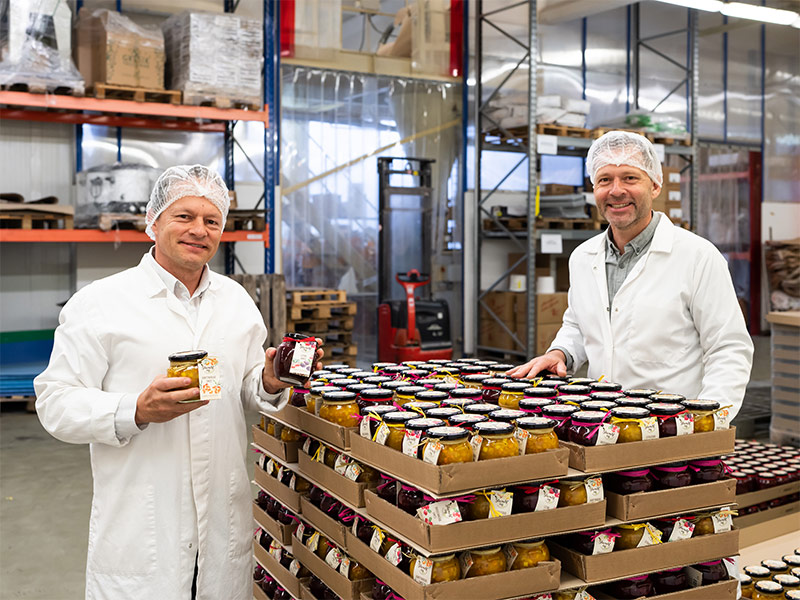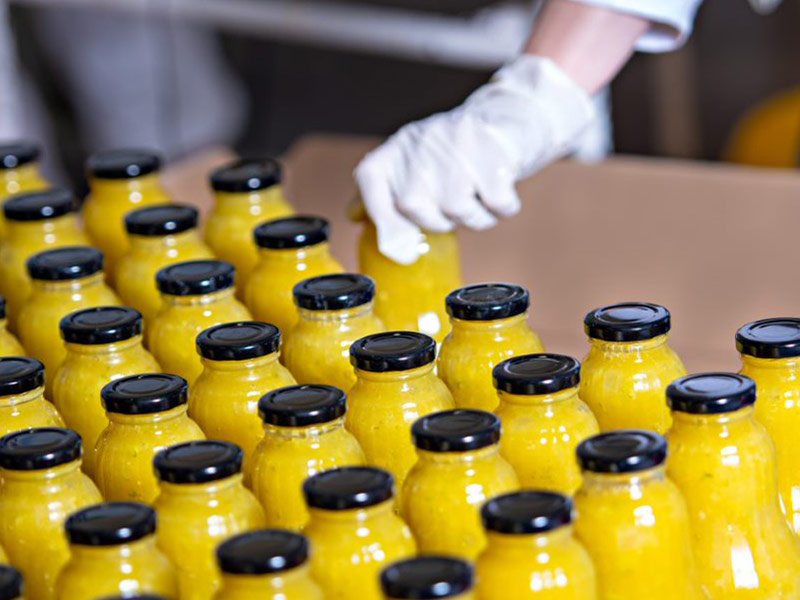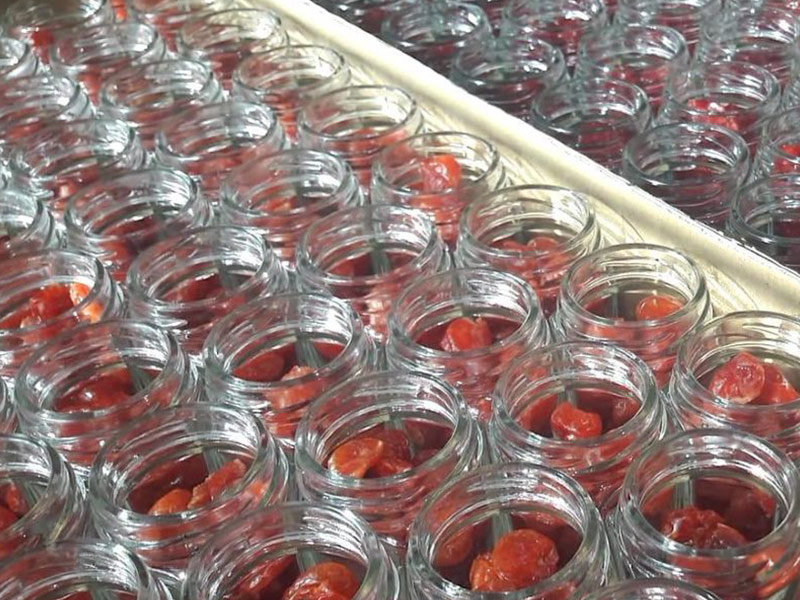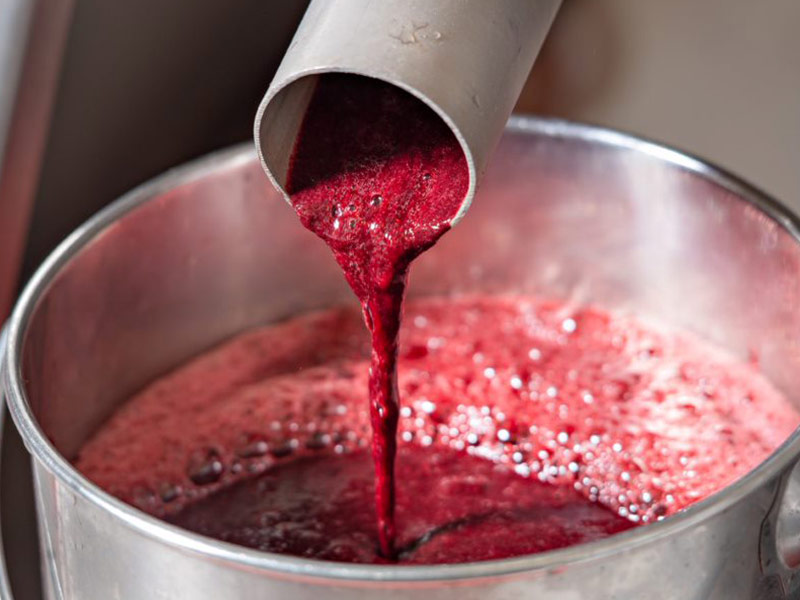Yes, you will find preservatives and antioxidants in our products. We are committed to keeping the colour and flavour of the fruit as good as possible after opening the Fruit in a Bottle pack. So that we don't leave the contents to "third parties" and compromise your health and well-being. Wondering why and what we use? You will find the detailed ingredients for each product. And in our glossary you can find a more detailed explanation of why we chose that particular ingredient.
Yes, you will find preservatives and antioxidants in our products. We are committed to keeping the colour and flavour of the fruit as good as possible after opening the Fruit in a Bottle pack. So that we don't leave the contents to "third parties" and compromise your health and well-being. We sweeten some products to make them palatable to a wider range of consumers. Wondering why and what we use? You will find the detailed ingredients for each product. And in our glossary, you can find a more detailed explanation of why we chose that particular ingredient.
What do you find in our recipes and why?

Antioxidants
...so that the fruit still has a beautiful colour.
In layman's terms, cell oxidation is the browning of cut fruit, which takes place literally in minutes. Apples, pears, apricots, peaches, strawberries and mangoes change colour.
We know from our customers how important the appearance of prepared drinks and food is to them. That's why we use gentle antioxidants to prevent colour degradation of fruit while extending the shelf life and safety of food. We mainly use sodium ascorbate, which is more or less a different form of vitamin C.
Preservatives
... so that you don't have to use the product immediately after opening.
Once opened, each product is immediately contaminated with microorganisms from the air. These begin to multiply rapidly. However, bacteria, yeasts and moulds are not visible until long after they have begun to 'work' on the food.
If we do not want to preserve with sugar, we must choose alternative products. We chose very carefully indeed. The preservatives we use can be found in all the premium fruit and vegetable producers. We are also experimenting with natural preservatives, which we use in our Mandarin concentrate.
Sweeteners
...so that everyone likes the fruit, even if it is sometimes very sour.
If possible, we avoid sugar, aspartame and many other problematic sweeteners. We mainly use sweeteners from the Stevia plant, as they sweeten up to 150 times more than sugar. We replace the sugar we save with fruit again.
You don't like stevia? No need to worry. The extracted sweetener is tasteless.
Thickeners
... because some fruits just "flow too much".
No chef in the world wants the contents of her carefully decorated pancakes or fritters to drip onto the floor instead of into the mouths of enthusiastic guests. Nor does anyone want to constantly shake the contents of the bottle to ensure that the pieces of fruit, pulp and juices are evenly distributed into each serving. And let's face it: concentrate that doesn't need to be constantly shaken looks so much better.
Antioxidants used

Sodium ascorbate (E301)
It is the sodium salt of ascorbic acid (E300) - vitamin C. It is used as an antioxidant, vitamin C or in the meat industry where it accelerates smoking and prevents the formation of cancer-causing substances (nitrosamines).
- Use is permitted throughout the Czech Republic (EU) and the USA.
- Acceptable/safe daily intake (ADI) not established
Information resources:
- FDA (Food and Drug Administration) Register
the substance is classified as GRAS (Generally Recognised As Safe in accordance with Good Manufacturing Practice)
Preservatives used
Sorbic acid and its salts (E200, E202 and E203)
Sorbic acid is extracted from the berries of mountain cranes, or more often synthetically by chemical means. Sorbic acid and its salts are considered the least harmful preservatives of all - they cause the least allergies. Its main role in food is to prevent the growth of mould, yeast and bacteria.
- Use is permitted throughout the Czech Republic (EU) and the USA.
- The acceptable/safe daily intake (ADI) is 11mg/kg of weight. This is about 0.75g/70kg person = 5.5 litres of ready-made lemonade, or 5.5kg of food preserved in this way. The WHO considers up to 25mg/kg of weight to be a safe level, more than double.
Information resources:
- EFSA (European Food Safety Authority) Register
EFSA document - Index JECFA
JECFA document - classified as an antimicrobial preservative and fungistatic agent. - FDA (Food and Drug Administration) Register
FDA document - the substance is classified as GRAS (Generally Recognised As Safe in accordance with Good Manufacturing Practice)
Sodium disulphite (E233)
It is an inorganic salt used as a preservative, preventing the spread of mould, bacteria and fungi. It is also an antioxidant, preventing the browning of fruits and foods, including beverages and wine.
- Its use is restricted in the Czech Republic (EU), but allowed in the USA.
- Acceptable/safe daily intake (ADI) is 0 - 0.7 mg per kilogram of body weight
Information resources:
- EFSA (European Food Safety Authority) Register
EFSA document
Thickeners
Sodium alginate (E401)
Sodium alginate is the sodium salt of alginic acid, which is obtained from brown algae. It is a viscous colloidal solution, insoluble in water. It is mainly used as a stabiliser, thickener and gelling agent. In the EU and the USA, sodium alginate is permitted for use in food, and may be added to baby food (baby food - desserts and puddings).
- Its use is allowed in the Czech Republic (EU)
- Acceptable/safe daily intake (ADI) is 0-25 mg/kg body weight
Information resources:
- EFSA (European Food Safety Authority) Register
EFSA document - FDA (Food and Drug Administration) Register
FDA document - the substance is classified as GRAS (Generally Recognised As Safe in accordance with Good Manufacturing Practice)
Guar gum (E412)
Guar gum is a soluble fibre that forms dense solutions with water (it has 5-8 times more thickening power than starch). It is found in the seeds of the plant species Cyamopsis tetragonolobus, which is mainly cultivated in India. It is used worldwide in the food industry as a stabiliser, thickener and emulsifier.
- Its use is allowed in the Czech Republic (EU).
- Acceptable/safe daily intake (ADI) is not limited
Sweeteners
Sorbitol (E420)
Sorbitol is a white sugar alcohol. It has a pleasant light sweet taste. It occurs naturally in berries such as cranberries, grape wine or other fruits (cherries, plums, pears, apples). It is mainly used as a sweetener, stabiliser and thickener. In the food industry, it is widely used as a sweetener for diabetics.
- In the Czech Republic (EU-wide), the use of sorbitol is allowed in products for purposes related to the sweetener function - except in baby food. In the USA it is allowed.
- Acceptable/safe daily intake (ADI) is not limited
Steviol glycoside (E960)
Steviol glycosides are extracted from the Stevia rebaudiana plant. They are completely neutral in taste and cannot be distinguished in beverages (not the same as "sweetened with stevia").
- In the Czech Republic (EU), the use of steviol glycosides is permitted in products for the purpose of acting as a sweetener suitable for diabetics.
- The acceptable/safe daily intake (ADI) is 4 mg/kg body weight per day.
Don't you understand the explanation? Want to ask for more details?
We will be happy to respond to you at madami@madami.cz.







